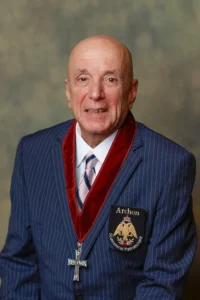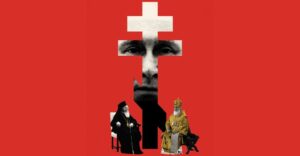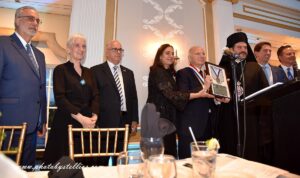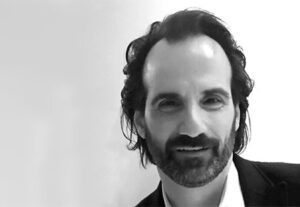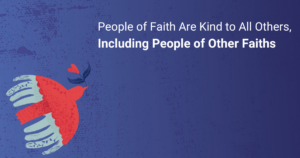
One recent Saturday afternoon, in the enervating heat and noise of Istanbul, the holiest man in the Orthodox Christian Church joined a queue to catch a ferry. His All Holiness the Ecumenical Patriarch Bartholomew I stood in line with about 200 others, mostly tourists, bound for the little island of Heybeliada, about an hour’s ride from the city. For many of those boarding the boat, a visit to the island is part of the experience of being in Istanbul, something recommended in the guidebooks. It has excellent beaches, a naval high school and a watersports club popular with Istanbul’s rich.
The Patriarch might have been just another day-tripper too, were it not for his long black cassock, the beautiful staff he carried, and a small entourage fussing around him and carrying briefcases and his travel bags. Still, even that was not enough to merit the attention of most of the other travellers, anxious to get a good seat on the ferry. They might have glanced at the man in black, but they did not acknowledge him.
The Patriarch doesn’t normally queue, he admits a few minutes later, when I remark on the informality of his embarkation. As the boat manoeuvres around the stretch of water where the Bosphorus joins the Marmara sea and begins our journey, he explains that the Patriarchate is awaiting the delivery of a new private boat to replace one that was sold recently. Until it arrives, he says, he is happy to line up with everybody else.
Bartholomew is the 270th occupier of the Patriarchate of Constantinople, one of the founding churches of Christendom. For his followers he is first among equals among the patriarchs of his church. His position is not universally accepted; in the notoriously schismatic Orthodox Church there is intense rivalry between Bartholomew and Alexei II of Moscow, whom the Russiian church–and perhaps the Russian government–would claim to be Bartholomew’s equal (they are involved in a fierce battle for the allegiance of the Orthodox Church in Ukraine). And since the Orthodox Church is organised more along national lines than the Roman Catholic Church, there is frequent dispute among the patriarchy. Still, Bartholomew is regarded, especially in Greece and the Anglo-Saxon world, as the leader of the world’s 300 million Orthodox Christians, and he has the mien and bearing of a man of influence. And for him, a visit to Heybeliada–known in Greek as Halki–is more a pilgrimage than a day out.
It is also a political act. At the summit of this speck of land stands a Greek Orthodox seminary that has been at the centre of an extraordinary dispute between Orthodox Christians and the authorities in Turkey since it was closed by Ankara in 1971. The dispute pits Turkey’s fiercely secular authorities against one of the world’s great Christian churches. It raises a profound question about the degree to which Turkey–whose prime minister Recep Tayyip Erdogan is said to pray at least three times a day–is committed historically and constitutionally to secularism. Can it grant rights to minority religions that it is not willing to grant to the majority faith? It also poses a dilemma both for Turkey and for Europe: can a Muslim country that aspires to join the European Union embrace freedom of religion and remain committed to stifling political Islam?
 The seminary, built on the site of the Holy Trinity monastery, is a splendid piece of mid-19th century school architecture, airy, high-ceilinged and with views of the sea or the city in every direction. It was opened in 1844, during a period of reform in the late Ottoman empire known as the Tanzimat, as a theological school to train priests for the Orthodox Church. The Patriarch himself was a student here from 1954 to 1961, and he describes it as “a perfect place between Earth and heaven”.
The seminary, built on the site of the Holy Trinity monastery, is a splendid piece of mid-19th century school architecture, airy, high-ceilinged and with views of the sea or the city in every direction. It was opened in 1844, during a period of reform in the late Ottoman empire known as the Tanzimat, as a theological school to train priests for the Orthodox Church. The Patriarch himself was a student here from 1954 to 1961, and he describes it as “a perfect place between Earth and heaven”.
 The seminary was closed as part of a campaign by the Turkish state beginning in the 1960s to rein in private educational institutions, which were felt to be a threat to the state ethos, especially if they were religious institutions. The seminary was included in this crackdown partly through a legal ruling that it could not remain independent. So it was officially “discontinued”. And despite a three-decade campaign by the church to reopen it, that is how it remains.
The seminary was closed as part of a campaign by the Turkish state beginning in the 1960s to rein in private educational institutions, which were felt to be a threat to the state ethos, especially if they were religious institutions. The seminary was included in this crackdown partly through a legal ruling that it could not remain independent. So it was officially “discontinued”. And despite a three-decade campaign by the church to reopen it, that is how it remains.
The silence of the seminary’s halls and classrooms and the threat from neglect to its library of theological and history books and old manuscripts, are emblematic of a wider problem: what Orthodox Christians claim is the systematic mistreatment of the Patriarchate over many years by successive Turkish governments. They say Ankara has confiscated not only the seminary but thousands of buildings–churches, schools, hospitals–that are the property of the Patriarchate, impoverishing it in a deliberate attempt to destroy it, or force it to leave Istanbul, where it has resided for 1,700 years.
So the conduct of the Turkish government, Orthodox Christians claim, is both an offence against Turkish history and a rebuke to the principle of religious freedom enshrined in the constitution. Every visit the Patriarch makes to the seminary, including the one he will make on this trip to Heybeliada, is therefore a way of reminding the authorities of what the church considers a violation of its historical and constitutional rights.
“We are a part of this country, born and educated here,” His All Holiness tells me on the ferry, in a voice that is both grave and soft. “That is why we are so disappointed, because although we [Orthodox Christians] are part of this country we are treated as second-class citizens. Because of our faith and our national background [essentially Greek] we are seen in a different way [to Muslim Turks]. It is a shame and a pity to have such a beautiful place empty when the Patriarchate has such great need of it.”
After his visit to the seminary, the Patriarch attends to the immediate task that has brought him to Heybeliada: the reopening and reconsecration of the tiny church of St Nicholas in the island’s little seaside town. Dressed in his most elaborate ecclesiastical robes and attended by several priests, some of whom have travelled from Greece, he begins the elaborate ceremony with prayers, incense and hymns sung in deep male voices. There is quite a crowd: most are tourists from Greece or from Istanbul’s tiny Greek Orthodox community, or have been invited especially for the occasion regardless of their religion.
The church has a plain exterior, but its interior is full of iconography: Jesus Christ, Mary, the saints. Its vaulted ceiling draws the gaze upwards towards the icons and decoration on the walls, and the high altar is a rich elaboration of wood and gold. Like a lot of interiors of Orthodox Christian churches, its decoration seems excessive. It is a vivid contrast with the places and forms of Muslim worship in Turkey. There are many wonderfully elaborate mosques all over the country; the collection of great mosques in Sultanahmet and Fatih, in old Istanbul, is among the world’s finest. But their elaboration is an exterior one; inside they are as austere and simple as the ceremonies they hold. Still, not even the fascination of the ceremony at St Nicholas can keep everybody entranced; the stifling heat soon sends some of the congregation outside, where evening is approaching and it is a little cooler.
 The Patriarchate – which is for Orthodox Christians what the Vatican is for Roman Catholics – is a collection of mostly wooden buildings that sits squarely in the middle of old Istanbul, in a district called Fener. Once this area was home to a sizeable population of Jews and ethnic Greeks; now it is among the most conservative Muslim quarters of the city. Women here are invariably covered from head to toe; their menfolk sit in teashops smoking and chatting. It seems an odd place for the world headquarters of a Christian church.
The Patriarchate – which is for Orthodox Christians what the Vatican is for Roman Catholics – is a collection of mostly wooden buildings that sits squarely in the middle of old Istanbul, in a district called Fener. Once this area was home to a sizeable population of Jews and ethnic Greeks; now it is among the most conservative Muslim quarters of the city. Women here are invariably covered from head to toe; their menfolk sit in teashops smoking and chatting. It seems an odd place for the world headquarters of a Christian church.
This modest compound is the focal point of Istanbul’s Greek Orthodox Christian community. Inside, it is a warren of corridors and rooms where informality appears to be the norm. Visitors to His All Holiness bow and kiss his hand on meeting him, but there is none of the ritual that surrounds the Pope in Rome. Outside, guards hover at the gate and there is airport-style security. On the advice of the local mayor, the Patriarch has a police bodyguard – seated discreetly behind us on the ferry – because of occasional hostility from neighbourhood nationalists.
 The Orthodox community in Turkey has three main components: Armenian, Greek and Syrian. Figures for how many adherents each branch has are difficult to find – the census does not classify them. Official estimates, however, suggest about 3,000 Greek Orthodox Christians, and there is little doubt that the community has been in decline for many years. Its interaction with the wider Turkish community in the city has invariably reflected over the years the state of relations between Turkey and Greece, which were antagonistic for many decades until the late 1990s but are now the warmest they have been for years (the prime ministers of the two countries are friends).
The Orthodox community in Turkey has three main components: Armenian, Greek and Syrian. Figures for how many adherents each branch has are difficult to find – the census does not classify them. Official estimates, however, suggest about 3,000 Greek Orthodox Christians, and there is little doubt that the community has been in decline for many years. Its interaction with the wider Turkish community in the city has invariably reflected over the years the state of relations between Turkey and Greece, which were antagonistic for many decades until the late 1990s but are now the warmest they have been for years (the prime ministers of the two countries are friends).
The relationship between Turkey and Greece is ancient and complex. But to understand their postwar history, it is necessary to recount the fate of the Greek Orthodox community in Istanbul. If nothing else, it helps to explain why there are so few members of that community today. In 1955, over a period of about 24 hours on September 6 and 7, Istanbul witnessed a mob assault against its ethnic Greek inhabitants that marked the beginning of the end for the community and the Orthodox Church in the city. This community numbered about 100,000 at the time, when Istanbul was much smaller than it is today.
The precise cause of what the Greek-American historian Speros Vryonis, in an exhaustive new history of the incident, calls a pogrom (ie that it was orchestrated by government forces) is complex. But it started when reports reached Istanbul that the house where Mustafa Kemal Ataturk–the founder of the republic of Turkey–is said to have been born, in the Greek city of Thessaloniki, had been bombed by Greek nationalists. The reports were not true; even today the origins of the reports appear unclear. Within a few hours hundreds of Greek businesses and institutions in Istanbul were ransacked and about 40 people were killed.
Walking the pleasant district of Cihangir in central Istanbul now, where much of the community lived, one sees houses on every other street standing empty even as the neighbourhood undergoes rapid gentrification. These are the homes of Greek families who fled after 1955 and that now exist in a kind of legal limbo awaiting some resolution that is not forthcoming. By the Besiktas fish market an Orthodox church stands silent and shrouded, and opposite it a school appears to be rotting away. These were centres of Greek life in Istanbul at one time; now they are reminders of an ugly and barely remembered incident in the city’s recent history.
Perhaps this is why Istanbul now feels like a city with something missing. Many residents of the city regret 1955 deeply. Today, however, thanks in part to the remarkable turnaround in Turkish/Greek relations, the Greek Orthodox community’s prospects may be brightening. Not only is the Patriarch a widely respected and much-liked man; the community, like many small minorities, is mostly wealthy and successful, and some of those who left in the 1970s and 1980s are returning to reclaim and renovate their properties, according to Alexis Alexandris, the consul-general of Greece in Istanbul.
One legacy of the disaster that befell the Greek Orthodox community in 1955, though, may be paradoxical: it has created a greater sense of its position inside Turkey today. What the community seeks now from the Turkish state–the reopening of the seminary on Heybeliada and a recognition of the Patriarch’s “ecumenical” status as a worldwide leader–they seek as Turkish citizens rather than as a religious minority. Part of the dismay the Patriarch feels at his treatment by the state is that he is intensely loyal to that state. “I spent two years in the Turkish army,” he tells me. “We [Orthodox Christians] pay our taxes, obey the laws, and we are very loyal citizens.”
So the quarrel between the Orthodox Church and Turkey is not one between Christians and Muslims. It is one between the church and the country’s secular authorities; and the stakes are high. Activists in the Orthodox Church say the very survival of the Patriarchate is at issue. For Turkey, the dispute raises a fascinating question about the place of religion in a secular society. It asks searching questions about Ankara’s treatment of minority religions. These questions, in turn, trouble the European Union, which Turkey wishes to join and which has absolute positions on such principles as religious freedom. The controversy offers a revealing glimpse of the dilemmas that Turkey faces as it becomes a freer and more democratic society.
Despite–or perhaps because of–the high stakes, Turkey has trouble making its case for the defence. This may be because Turkey does not have one: the fate of the seminary on Heybeliada appears, on the face of it, to be open and shut. Or it may be because it is unwilling to undertake a unilateral act before October 3, when it begins the formal EU accession process. Reopening the seminary could therefore be a bargaining chip to be played at a more propitious moment.
The issue is extremely sensitive, nonetheless. Not only did both the directorate of religious affairs and the foreign ministry decline to speak on the record for this article; it is difficult to ascertain even what the official position is on the seminary. What is clear, however, is that reopening it is not a simple matter. If it were, a decree to do so would have been issued long ago because, officials assured me, the government is “pre-disposed” to finding a solution. But, the officials said, reopening the seminary presents a complicated legal, political, diplomatic and electoral quandary for the current government, which is headed by the most openly devout Muslim prime minister in Turkey’s recent history.
I first got a sense of how potent the quarrel is becoming about three months ago, during a conversation with two Americans over coffee in an Istanbul hotel. Anthony Limberakis is a radiologist in Philadelphia, and one of the leading members–or ‘archons’–of the Greek Orthodox church in the US. With him was Father Alex Karloutsos, an Orthodox priest from Long Island.
They had arrived in Istanbul from Brussels, which has become the latest and, arguably, the most important battleground in the seminary dispute. The Patriarch himself was there a few weeks ago, raising the issue with the European Commission and expressing his support for Turkey’s EU membership. Limberakis and Karloutsos say they also support Turkey’s EU bid. But there is a sense of urgency in their words, and not a little anger.
The plight of the Patriarchate inside Turkey, Limberakis says, “is an impending catastrophe. We are talking about the very survival of the spiritual centre of world Orthodoxy. For a secular country to be consumed with [a perceived threat from] a few thousand Christians is very perplexing. Turkey ought to be greater than that.” He also finds insulting Turkey’s refusal to recognise the term “Ecumenical” in the Patriarch’s title, which refers to his worldwide vocation.
Karloutsos hands me a list of properties listed as “confiscated by the government of Turkey between 1974 and 2002”. It contains details of 153 hospitals owned by the Patriarchate that were, in effect, nationalised by the state during that time. The list is part of a hefty batch of documents presented to the US Congress (which Karloutsos also gives me) as part of an intense lobbying effort that has won the backing of powerful US politicians and church leaders.
Limberakis and Karloutsos have now turned their attention to the EU, aware that it offers the best immediate hope for a solution. During the accession process Turkey can expect the minutest scrutiny of its record in observing and implementing human and civil rights. Its record is poor but improving; its stance on the seminary, according to diplomats in Ankara, will be a test of how far it is prepared to go to accept certain principles that may conflict with its current, secular constitutional settlement.
On the face of it, this settlement ordains a strict separation between the state and religion in Turkey. Ataturk decreed that the country was to be secular, nationalist, republican, popular, statist and modern. These are its governing principles today, 82 years after it was created from the ruins of the Ottoman empire. So the people of Turkey, the majority of whom are Sunni Muslims, are free to worship. But what and even how they worship is, to a large extent, dictated by the state.
One of the main functions of the Directorate of Religious Affairs, an arm of the government, is to write the sermons that are preached in mosques every Friday. Religious schooling is permissible but limited, and is tightly controlled. Many Turkish people are quite content with this arrangement, believing that it protects them from a stifling and perhaps oppressive Islam. Others are not, believing that it has left a spiritual vacuum, perhaps even a hostility to religion per se, at the heart of the Turkish state.
However, as Ali Carkoglu, a professor at Sabanci University in Istanbul, puts it, the result is that Turkey does not recognise any religious authority independent of the state. This, as much as anything, is what secularism means in Turkey today. “All imams [in Turkey] are state officials–clerks, basically,” Carkoglu says. “They follow orders. So, if [Turkey] recognises a religious authority that is not under state control, the whole system will change. The issue of the Patriarchate touches that nerve.”
There is an irony to Turkey’s stance on secularism–or, more accurately, French-style laicism – that is not appreciated very well in the EU. By strictly controlling what they say, Turkey in general has avoided the phenomenon of radical imams that is now causing such soul-searching in Britain and France. Instead, religious practice in Turkey is largely a private matter, which is how the constitution and the secular authorities have always regarded it, Carkoglu says.
According to Cengiz Aktar, a prominent Turkish academic who is the head of a Turkish/Greek friendship society, part of Turkey’s dilemma about how to deal with the Patriarchate and with other Christian religions is that the authorities in Turkey do not really understand the Christian world. “There are lacunae in the appreciation of the role of the Patriarchate in the world among the secular authorities,” he says. “In a wider sense, reopening the seminary would strengthen the position of Istanbul within the Orthodox Church. But there is no appreciation among the secular authorities that this might be beneficial for Turkey.”
Olli Rehn is the EU’s commissioner in charge of expanding the union to include new members. He sums up the EU’s position in fairly stark terms: “Freedom of religion is one of the core issues to be addressed by Turkey, and the reopening of Halki is a critical litmus test of its implementation,” Rehn says in a telephone interview. “I have significant difficulties to understand how a tiny Christian minority could pose any threat to the Turkish state or to the predominant culture in Turkey. It should be as easy to open a church in Eskisehir [a town near Ankara] as it is to open a mosque in Finland. But it is not, for the moment.”
So why is Ankara not acting to reopen the seminary? In my conversations with officials and with opinion-formers who are familiar with the issue, I got a clear sense that there is a desire bordering on urgency to find a solution. They acknowledge that the reopening of the seminary, and the benefits it would bring to the Orthodox Church, present no threat to Turkey; the opposite is true. It would reap instant dividends in relations with the EU and the US. It would also help to neutralise the growing body of opinion outside Turkey that the country does not respect the fundamental value of freedom of religion.
The government, rooted in the country’s tradition of political Islam, arguably should have ordered the reopening of the seminary after it came to power in late 2002 on a wave of popular disenchantment with the state of Turkish politics. Perhaps it would have done had it realised how thorny the problem would become. Now, however, it may be too late for this government to act. To understand why, it is necessary to appreciate the difficulties in which Erdogan now finds himself and his government. Rehn’s comment about Turkey becoming more like Finland is not glib; it cuts to the heart of the Turkish dilemma.
When Erdogan and his Justice and Development party were elected, the bedrock of their support came from Muslim voters outside the big cities who were appalled at the corruption that was then (and still is) rampant, and whose way of life had been undermined by a financial crisis in 2000-2001 that scarred Turkey’s emerging middle class. The government has not wiped out corruption. But it has steadied the economy, satisfying at least one demand of its core voters.
Now those core voters want something else. They want their sons to be educated at religious schools (which is permitted) and then to have the freedom to pursue a university education of their choice (which is not). They may even want to make adultery a criminal offence, as Erdogan tried (and failed) to do last autumn, to the horror of secularists. Most of all, they want their daughters to be able to wear a headscarf as a matter of civil and religious liberty (“covered women” may not enter official buildings or attend classes at state universities, and may not be appointed to a range of jobs in the civil administration). One might say that they want what Patriarch Bartholomew wants – the freedom to govern their religious lives as they choose, without state interference.
Yet whenever Erdogan tries to make concessions to these voters, he bumps up against the constitution, and sometimes even against the military, which considers itself the guardian of Ataturk’s legacy. When he sought last year to allow boys from religious high schools to pursue a university education of their choosing, he was forced to abandon the measure because of fierce opposition from secularists. Despite his huge parliamentary majority (due less to the size of his core vote than to the electoral rules concerning parliamentary representation), Turkey’s secular forces are remarkably powerful, and even if they cannot stop him, the constitution and constitutional court probably will.
So if Erdogan cannot provide his core Muslim voters with greater religious freedom, how can he offer it to Turkey’s tiny Orthodox Christian community? It would be electoral suicide. It is not that the vast majority of Turkish Muslims want to keep the seminary closed; it is that, if the Orthodox community can have a religious school independent of the state, then so should they. Turkey may ultimately be able to present a solution to the seminary closure, one that is acceptable to everybody, only through a wider move that addresses the grievances of all religions. There is no sign that this country is ready for such a constitutional upheaval.
In the past, Patriarch Bartholomew has expressed his belief that the seminary on Heybeliada will one day reopen. He said he believed it would reopen as he believed in God. When I ask him, on the ferry, what he thinks today, he sounds pessimistic, even deflated. He says: “I still hope that one day we will get permission to reopen it.” And he cannot resist referring to one last irony of the closure of his beloved and silent seminary. In the garden in front of the seminary there is a bust of Ataturk above a slogan attributed to the great man that reads: “The main virtue in life is knowledge.” His All Holiness smiles a weak smile. “How ironic,” he says, “that this should appear at the entrance to a closed school.”
Vincent Boland is an FT correspondent based in Ankara.
read the article: Faith, hope and parity

